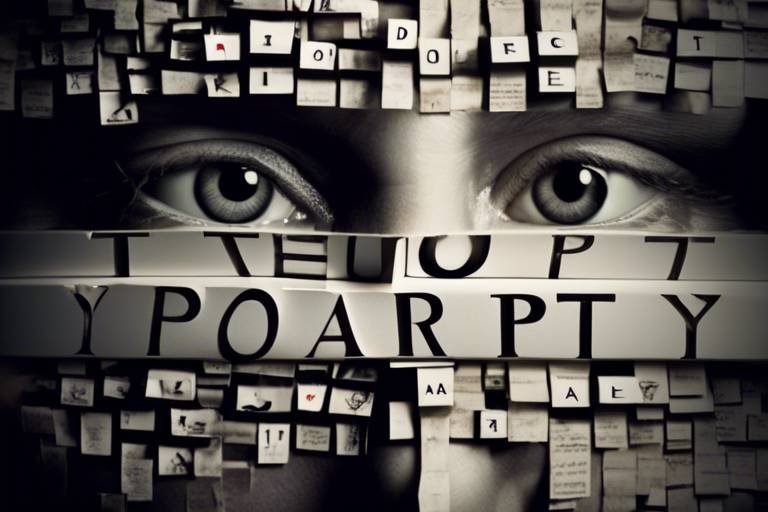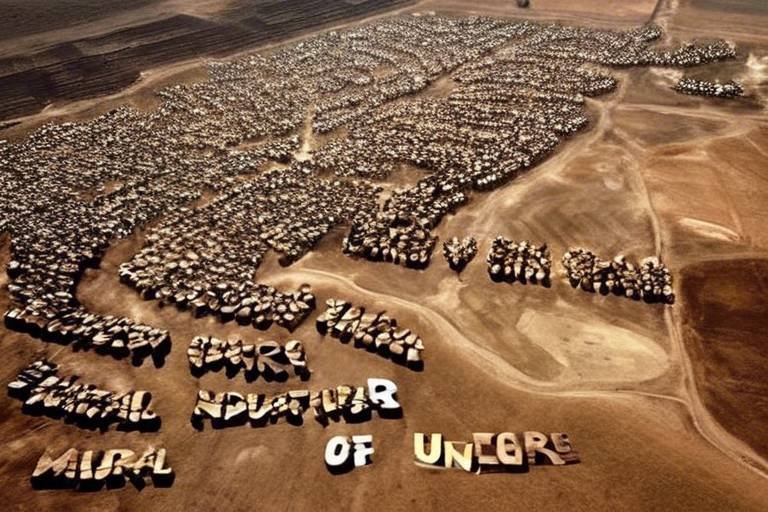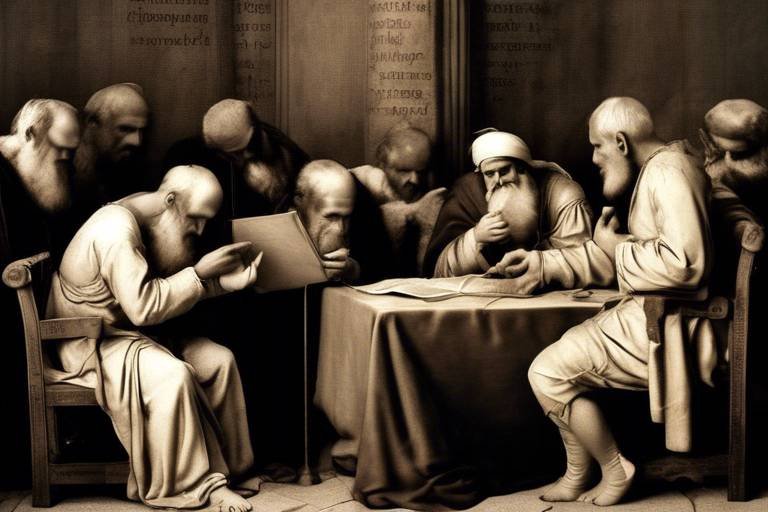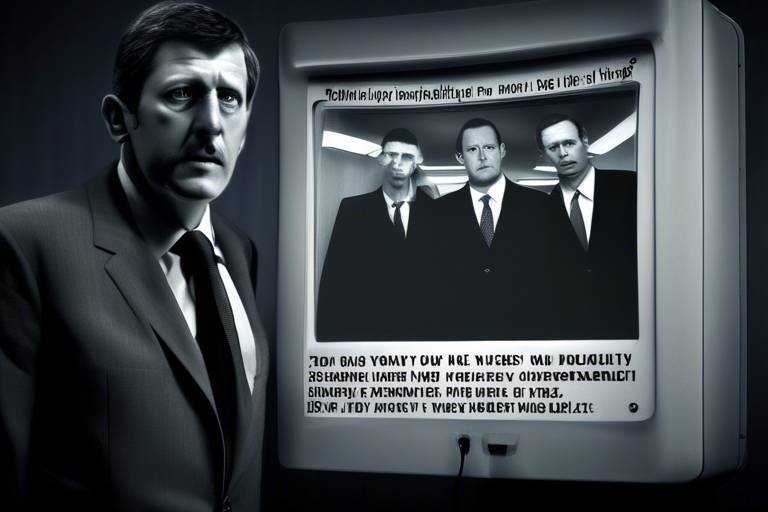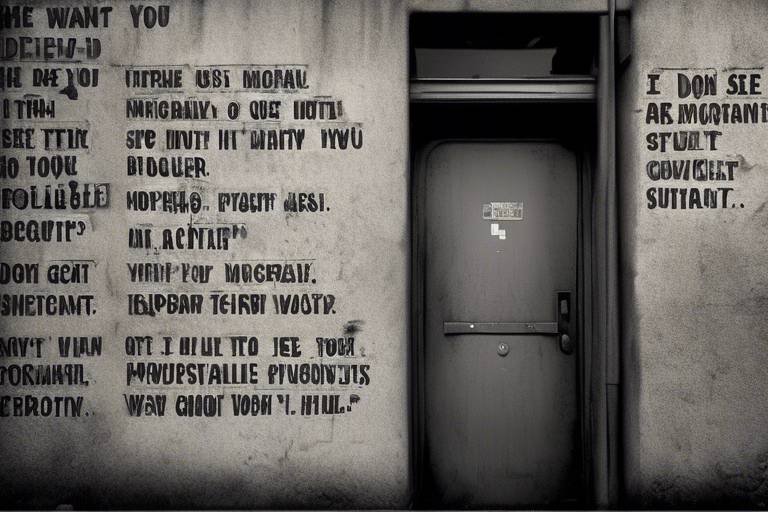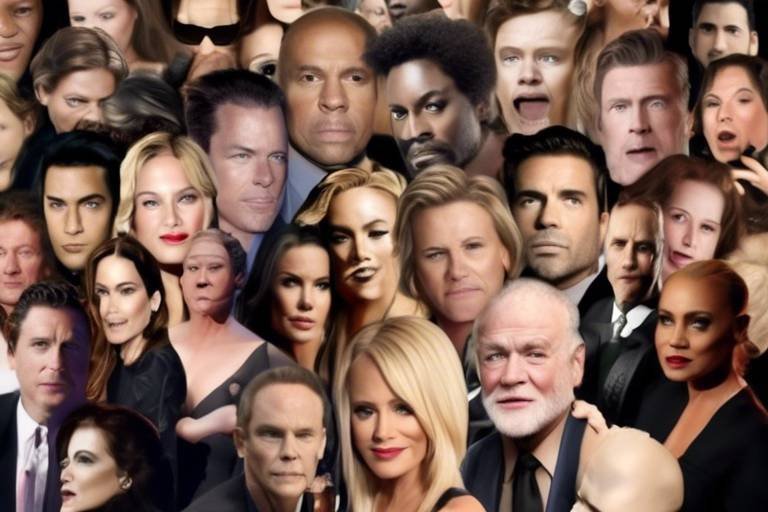Can a Liars’ Paradox Exist in Elegant Framework of Morality?
The liars’ paradox is a fascinating conundrum that invites us to ponder the very essence of truth and morality. Imagine a statement like "I am lying." If this statement is true, then the speaker is indeed lying, which means the statement must be false. But if it’s false, then the speaker is telling the truth. This swirling contradiction not only captivates logicians and philosophers but also poses significant questions for moral philosophy. Can we reconcile such contradictions within our ethical frameworks? This article will delve into this intriguing intersection, exploring how the liars’ paradox challenges our understanding of truth, ethics, and the very frameworks that govern moral reasoning.
At its core, the liars’ paradox serves as a mirror reflecting our struggle with self-reference and the nature of truth. It's like trying to catch smoke with your bare hands; the more you grasp at it, the more elusive it becomes. This paradox forces us to confront uncomfortable truths about our beliefs and the principles we hold dear. As we navigate through various ethical theories, we will see how each framework attempts to address or sidestep the complications introduced by this paradox. From consequentialism, which focuses on the outcomes of actions, to deontology, which prioritizes rules and duties, and virtue ethics, which emphasizes character, each perspective offers a unique lens through which to examine the implications of the liars’ paradox.
In this exploration, we will not only dissect these ethical theories but also engage with real-world scenarios that highlight the practical challenges posed by the liars’ paradox. For instance, consider a situation where a consequentialist must decide whether to lie to protect someone's feelings. The outcome may seem justifiable, but how does this align with a commitment to truth? Or think about a deontologist grappling with a rule that prohibits lying, even when the truth may lead to harm. These dilemmas illustrate the tension between ethical obligations and the complexities of truth, showcasing the intricate dance between morality and the liars’ paradox.
As we journey through this philosophical landscape, we will also touch on the social implications of the liars’ paradox. How do communities navigate the murky waters of truth and morality when faced with such contradictions? The answers may not be straightforward, but they are essential for understanding the fabric of our ethical lives. Ultimately, this article aims to illuminate the elegant yet complicated relationship between the liars’ paradox and moral frameworks, inviting you to reflect on your own beliefs and the nature of truth in your life.
- What is the liars’ paradox? The liars’ paradox is a self-referential statement that contradicts itself, such as "This statement is false." It raises questions about the nature of truth and logic.
- How does the liars’ paradox relate to morality? The liars’ paradox challenges our understanding of truth, which is fundamental to ethical reasoning, thus complicating moral decisions.
- What are the main ethical frameworks discussed? The article discusses consequentialism, deontology, and virtue ethics, each providing different perspectives on how to address the liars’ paradox.
- Can moral absolutes exist in light of the liars’ paradox? This question is central to the discussion, as the paradox challenges the consistency of moral rules and duties.
- What are the social implications of the liars’ paradox? Communities must navigate the challenges of truth and morality, especially when faced with contradictions inherent in the liars’ paradox.

The Nature of the Liars' Paradox
The liars' paradox is a fascinating conundrum that has puzzled philosophers, logicians, and linguists for centuries. At its core, the paradox arises from a simple statement: "This statement is false." If the statement is true, then it must be false as it claims; however, if it is false, then it must be true. This self-referential loop creates a situation where truth becomes a slippery concept, challenging our traditional understanding of logic and language.
To grasp the significance of the liars' paradox, we must first acknowledge its implications for our understanding of truth. Truth is often seen as a binary condition—something is either true or false. However, the liars' paradox introduces a third possibility: a statement that cannot be classified as either true or false. This leads to a rich tapestry of questions about the nature of language, meaning, and reference. For instance, how do we navigate statements that contradict themselves? What does it mean for a statement to be true if it simultaneously asserts its own falsehood?
In philosophical discussions, the liars' paradox serves as a powerful tool for examining the limitations of our logical frameworks. It pushes us to reconsider the foundations of our reasoning and the very language we use to describe our thoughts. The paradox invites a deeper inquiry into the principles that govern our understanding of reality, ethics, and morality. It raises questions such as:
- Can a statement be both true and false at the same time?
- How does self-reference affect our comprehension of truth?
- What implications does the paradox have for moral reasoning?
As we explore these questions, we find that the liars' paradox not only challenges our logical frameworks but also has profound implications for the field of moral philosophy. The intersection of self-reference and ethics prompts us to consider how contradictions can emerge within our moral reasoning. For instance, if a moral statement is deemed true but simultaneously contradicts itself, how do we reconcile this with our ethical beliefs? This is where the paradox becomes a crucial component in understanding the complexities of moral frameworks.
In essence, the liars' paradox serves as a mirror reflecting the intricacies of our thought processes. It compels us to confront the uncomfortable reality that our understanding of truth is not always straightforward. As we delve deeper into the philosophical significance of this paradox, we begin to uncover its implications for various ethical theories, ultimately leading us to a richer understanding of morality itself.

Morality and Ethical Frameworks
Morality is not just a set of rules; it’s a complex web of beliefs, values, and principles that guide our actions and decisions. When we dive into the realm of ethical frameworks, we uncover the diverse philosophies that shape our understanding of right and wrong. Each framework offers a unique lens through which to view moral dilemmas, and they often lead us to different conclusions about what it means to be ethical. For instance, consider the three primary ethical theories: consequentialism, deontology, and virtue ethics. Each of these approaches presents a distinct methodology for evaluating moral actions and decisions.
Consequentialism, for example, posits that the morality of an action is determined solely by its outcomes. This perspective raises intriguing questions about the importance of truth. If the end justifies the means, does that mean that lying can sometimes be moral if it leads to a greater good? In contrast, deontological ethics focuses on the adherence to rules and duties, suggesting that certain actions are inherently right or wrong, regardless of their consequences. This creates a fascinating tension with the liars’ paradox, as moral absolutes may clash with self-referential statements that defy straightforward categorization.
Virtue ethics, on the other hand, shifts the focus from rules and outcomes to the character of the moral agent. It emphasizes the importance of developing virtues such as honesty, courage, and integrity. This perspective invites us to consider how the liars’ paradox impacts our understanding of personal integrity. If a person is known to lie, can they still be considered virtuous? This question highlights the intricate relationship between truth and character, illustrating how our ethical frameworks can shape our perceptions of morality.
To further understand these frameworks, let’s explore how they interact with the liars’ paradox. The following table summarizes the key characteristics of each ethical theory:
| Ethical Theory | Focus | Key Question |
|---|---|---|
| Consequentialism | Outcomes | Is the outcome beneficial? |
| Deontology | Rules | Does it adhere to moral duties? |
| Virtue Ethics | Character | Does it develop moral virtues? |
As we navigate through these frameworks, we must also consider how they influence our understanding of truth. Each approach offers a different perspective on the liars’ paradox, challenging us to reflect on the implications of contradictions in our moral reasoning. For example, a consequentialist might argue that a lie is acceptable if it leads to a positive outcome, while a deontologist would likely reject lying outright, emphasizing the moral obligation to tell the truth. Meanwhile, virtue ethicists would encourage us to cultivate honesty as a virtue, suggesting that our character shapes our moral choices.
Ultimately, the interplay between morality and ethical frameworks reveals the complexity of human behavior and the challenges we face in making ethical decisions. As we grapple with the liars’ paradox, we are reminded that morality is not a one-size-fits-all concept; it is nuanced, multifaceted, and deeply influenced by the frameworks we choose to adopt. In a world where truth can be elusive, understanding these ethical theories is essential for navigating the moral landscape.
- What is the liars' paradox? The liars' paradox is a self-referential statement that asserts its own falsehood, creating a contradiction that challenges our understanding of truth.
- How do ethical frameworks differ from one another? Ethical frameworks vary in their focus; some prioritize outcomes (consequentialism), others emphasize adherence to rules (deontology), while some center on character development (virtue ethics).
- Can lying ever be considered moral? This depends on the ethical framework applied. Consequentialists might accept lying if it leads to a better outcome, while deontologists would typically reject it as inherently immoral.
- How does virtue ethics relate to the liars' paradox? Virtue ethics encourages the cultivation of moral character, leading to questions about how consistent honesty is with the paradox's implications on truth.

Consequentialism and Truth
Consequentialism, at its core, is a moral philosophy that judges the rightness or wrongness of actions based solely on their outcomes. This approach raises fascinating questions about the role of truth in ethical decision-making. When we consider the liars’ paradox, we find ourselves in a web of contradictions that challenges how we perceive consequences. Can a lie ever lead to a good outcome? If so, does that make the lie morally acceptable? These questions are not just academic; they resonate in real-world scenarios where the stakes can be incredibly high.
Imagine a situation where a doctor must decide whether to tell a patient the full truth about a terminal diagnosis. If the doctor believes that revealing the harsh reality could lead to despair and a quicker decline, they might choose to withhold certain details. Herein lies the conflict: the doctor’s intention is to protect the patient, yet the act of withholding information is, in essence, a lie. Does the potential positive outcome justify the deception? This dilemma illustrates how consequentialism grapples with the liars’ paradox.
Furthermore, the liars’ paradox can complicate the decision-making process within consequentialism. When faced with a situation where the truth is ambiguous or contradictory, how do we evaluate the potential outcomes? For example, consider a scenario where a politician makes a promise that they know they cannot keep, yet they do so believing it will rally public support and lead to a policy that benefits society. This raises profound ethical questions: Is the politician’s deception justified if the outcome is perceived as beneficial? Or does the inherent contradiction of lying undermine the moral weight of their actions?
To delve deeper into this, let's examine a few key implications of the liars’ paradox on consequentialist thinking:
- Ambiguity of Truth: In consequentialist frameworks, the definition of truth can become clouded, leading to ethical dilemmas where the ends may seem to justify the means.
- Outcome Over Intention: Consequentialism prioritizes results, which can sometimes lead to moral justifications for actions that, in isolation, would be considered unethical.
- Complex Decision-Making: The presence of the liars’ paradox can create a ripple effect in decision-making, where the consequences of lying may be weighed against the potential benefits of honesty.
Ultimately, the challenge lies in navigating these murky waters. As we evaluate actions through the lens of consequentialism, we must grapple with the inherent contradictions that the liars’ paradox presents. It forces us to ask difficult questions about the nature of truth, the morality of our decisions, and the ethical frameworks we adhere to. In a world where outcomes often dictate our moral compass, the paradox serves as a reminder that truth is not always black and white, and our ethical decisions may be more complex than we initially believe.
- What is consequentialism? Consequentialism is a moral philosophy that evaluates the morality of actions based on their outcomes rather than intentions.
- How does the liars' paradox affect decision-making? The liars' paradox complicates decision-making by introducing contradictions that challenge our understanding of truth and ethical outcomes.
- Can a lie ever be justified in consequentialism? In some cases, a lie may be justified if it leads to a significantly better outcome, but this raises complex ethical questions.

Impacts on Decision-Making
The liars’ paradox presents a fascinating challenge to decision-making processes, particularly within the realm of consequentialism. At its core, the paradox suggests that a statement can be both true and false simultaneously, which can create a fog of uncertainty when making ethical decisions. Imagine trying to navigate a maze where the walls keep shifting; that’s what decision-making feels like when confronted with the complexities of the liars' paradox. This uncertainty can lead to a series of dilemmas, especially when the truth becomes elusive.
When faced with a situation where the truth is ambiguous, a consequentialist might struggle to determine the best course of action. After all, if the outcomes of a decision depend on the veracity of the information at hand, what happens when that information is contradictory? For instance, consider a scenario in which a person must decide whether to tell a lie to avoid causing harm. If telling the truth leads to negative consequences, yet lying also presents ethical dilemmas, how does one choose the “right” path?
To illustrate this complexity, let’s look at a few scenarios where the liars’ paradox complicates decision-making:
- Scenario 1: A whistleblower must decide whether to expose unethical practices within a company. If they lie about the severity of the situation to protect their colleagues, they may prevent immediate harm, but at what cost to their integrity?
- Scenario 2: A doctor is faced with a patient who wants to know the truth about a terminal diagnosis. If the doctor lies to spare the patient’s feelings, they may create a false sense of hope, impacting the patient’s decision-making regarding treatment.
In both scenarios, the liars’ paradox introduces a layer of complexity that forces individuals to reconsider their ethical priorities. The ultimate question becomes: does the end justify the means? This question is central to consequentialist ethics, yet the paradox can lead to a stalemate, where every potential action seems to bear its own set of contradictions.
Moreover, the implications of these decision-making challenges extend beyond individual choices; they can ripple through entire organizations and communities. When leaders grapple with the liars’ paradox, their decisions can shape public perception and trust. If a leader is perceived as dishonest, even in the name of a greater good, the fallout can be detrimental, leading to a loss of credibility and moral authority.
In conclusion, the liars’ paradox not only complicates individual decision-making but also poses significant challenges for societal ethics. As we navigate a world filled with contradictions, it becomes increasingly important to develop frameworks that can accommodate these complexities, allowing for more nuanced understandings of truth and morality.
- What is the liars’ paradox? The liars’ paradox is a self-referential statement where a person claims, “I am lying.” If the statement is true, then the person is indeed lying, making the statement false.
- How does the liars’ paradox affect moral decision-making? It complicates the process by introducing uncertainty about truth, which can lead to ethical dilemmas where the outcomes of decisions are ambiguous.
- Can we resolve the contradictions presented by the liars’ paradox? While there is no definitive resolution, various ethical frameworks provide different approaches to navigate these contradictions and make informed decisions.

Case Studies
The liars' paradox may seem like a mere philosophical puzzle, but its implications ripple through real-world ethical dilemmas, particularly within the framework of consequentialism. To illustrate this, let's delve into a few compelling case studies that showcase how the paradox manifests in moral judgments and decision-making processes.
One notable example is the classic "Trolley Problem," a thought experiment that poses a moral quandary: should one pull a lever to divert a runaway trolley onto a track where it will kill one person instead of five? Here, the paradox emerges when considering the truth of the outcomes. If one believes that saving five lives is a greater moral good than saving one, the decision seems clear-cut. However, if the statement "I will pull the lever" is taken as true, it also implies that the individual is responsible for the death of the one person—a truth that complicates the moral calculus.
Another intriguing case is the "Liar's Paradox in Politics." Consider a politician who states, "I am lying." If the statement is true, then the politician is indeed lying, which means the statement must be false. This contradiction creates a chaotic scenario where voters struggle to discern truth from deception, ultimately affecting their ethical decision-making during elections. Here, the liars' paradox not only questions the integrity of the politician but also challenges the moral framework within which voters operate.
To further illustrate these points, we can look at a table summarizing these case studies:
| Case Study | Situation | Ethical Dilemma | Liars' Paradox Implication |
|---|---|---|---|
| Trolley Problem | Diverting a trolley to save five lives at the cost of one | Is it moral to actively cause harm to save more lives? | Truth of outcomes vs. moral responsibility |
| Political Liar | Politician claims, "I am lying" | How do voters discern truth in political statements? | Confusion of truth and deception influences ethical choices |
These case studies reveal that the liars' paradox is not just a theoretical construct; it has tangible consequences in how we navigate morality and ethics in our daily lives. By grappling with these contradictions, we can better understand the complexities of truth and the ethical frameworks we rely on. The paradox encourages us to reflect on our moral decisions, pushing us to consider the implications of our beliefs and actions more deeply.

Deontology and Moral Absolutes
Deontology, a term that might sound like a mouthful, is all about the rules and duties that govern our moral landscape. Unlike consequentialism, which prioritizes the outcomes of actions, deontological ethics insists that certain actions are inherently right or wrong, regardless of their consequences. This idea of moral absolutes raises a fascinating question: how do we handle the contradictions presented by the liars' paradox? The liars' paradox, which asserts the statement "This statement is false," challenges our understanding of truth. If we accept this statement as true, then it must be false, and vice versa. This creates a conundrum not just for logic but also for moral reasoning.
In the realm of deontology, moral absolutes suggest that some actions, like telling the truth, are always right. However, when confronted with the liars' paradox, we must ask ourselves: can a statement that is inherently contradictory still hold moral weight? For instance, if a person were to utter a lie that is self-referential, does that make it a moral failing, or does it complicate our understanding of their character? Deontologists might argue that the act of lying itself is wrong, but the paradox invites a deeper exploration of intention and context.
To illustrate this, consider the following table that outlines key distinctions between deontological ethics and the implications of the liars' paradox:
| Aspect | Deontological Ethics | Liars' Paradox Implications |
|---|---|---|
| Focus | Moral rules and duties | Contradictions in truth statements |
| Truth | Always telling the truth is a duty | Truth can be self-referentially false |
| Outcome | Outcomes are secondary | Truth may not lead to clear outcomes |
In essence, deontological ethics struggles with the liars' paradox because it relies on a straightforward understanding of truth. When faced with self-referential statements, the rigidity of moral rules can seem inadequate. For example, if a deontologist encounters a scenario where telling the truth leads to harm, they may grapple with the implications of their moral framework. This scenario raises the question: is it morally permissible to lie in certain situations, or does that undermine the very foundation of deontological ethics?
Moreover, the liars' paradox can challenge our perception of moral integrity. If a person holds steadfast to their moral beliefs but occasionally encounters situations where those beliefs lead to contradictions, how do we assess their character? The paradox invites us to reflect on the complexity of human morality, suggesting that perhaps moral absolutes aren't as absolute as they seem.
Ultimately, the intersection of deontology and the liars' paradox forces us to reconsider how we define right and wrong. It challenges the notion of unyielding moral principles and opens the door to a more nuanced understanding of ethics. As we navigate through these philosophical waters, we must remain aware of the implications our beliefs have on our actions and the broader society.

Virtue Ethics and Character
When we dive into the world of virtue ethics, we find ourselves exploring the very essence of what makes a person morally good. Unlike other ethical frameworks that focus on rules or outcomes, virtue ethics zeroes in on the character of the individual. It asks us to consider not just what we do, but who we are. This perspective is particularly interesting when we introduce the liars’ paradox into the conversation. The paradox challenges our understanding of truth and integrity, leading us to question how these elements shape our character.
At its core, virtue ethics posits that developing good character traits—such as honesty, courage, and compassion—leads to a fulfilling and morally sound life. However, when we encounter contradictions like the liars’ paradox, it complicates our ability to define and uphold these virtues. For instance, if a person claims, "I am lying," they create a contradiction that leaves us questioning their integrity. This situation can lead to a crisis of character, where an individual’s moral standing is put to the test. How do we reconcile the need for honesty with the existence of self-referential contradictions?
The liars’ paradox forces us to reflect on the consistency of our character traits. Are we truly honest, or do we sometimes bend the truth? This inconsistency can lead to a broader discussion about moral integrity. In virtue ethics, integrity is not merely about adhering to a set of rules; it’s about cultivating a character that embodies moral virtues consistently. Thus, the paradox compels us to examine our own lives and ask difficult questions:
- What does it mean to be honest in a world filled with contradictions?
- Can we truly develop virtues if our understanding of truth is so fluid?
- How do we maintain personal integrity when faced with moral dilemmas?
Moreover, the liars’ paradox can also have social implications. In communities where virtue ethics is valued, the paradox may challenge the societal norms that dictate what is considered honest or virtuous behavior. If individuals within a community grapple with the complexities of truth, it can lead to a broader reevaluation of what it means to be a good person. Are we, as a society, willing to accept that our understanding of virtue may not be as clear-cut as we once thought?
In conclusion, the intersection of virtue ethics and the liars’ paradox invites us to engage in a deeper exploration of character. It encourages us to look beyond simple definitions of right and wrong, and to consider the complexities of human nature. Ultimately, it reminds us that developing a virtuous character is an ongoing journey, one that requires us to confront contradictions and embrace the nuances of morality.
- What is virtue ethics? Virtue ethics is an ethical framework that emphasizes the importance of moral character and virtues in determining what is right or wrong.
- How does the liars’ paradox relate to virtue ethics? The liars’ paradox challenges our understanding of truth, which in turn complicates the consistency of character traits that virtue ethics promotes.
- Can virtue ethics provide guidance in complex moral situations? Yes, virtue ethics encourages individuals to reflect on their character and virtues, which can guide them in making ethical decisions.

Character Development
The concept of is crucial in understanding how individuals navigate the complexities of morality, especially when faced with the challenges posed by the liars’ paradox. At its core, character development involves the growth and evolution of a person's moral traits, which are often tested in situations where truth and deception collide. Imagine a sculptor chiseling away at a block of marble; each decision, each experience, shapes the final statue that represents our moral character. But what happens when the very foundation of truth becomes slippery? How do we maintain our integrity when faced with contradictions?
In this context, the liars’ paradox serves as a mirror reflecting the inconsistencies in our moral fabric. When we declare, "I am lying," we are confronted with a self-referential puzzle that challenges our understanding of honesty. This paradox not only complicates our perception of truth but also prompts us to reevaluate the virtues we hold dear. Are we truly honest, or do we sometimes bend the truth to fit our narratives? This introspection is vital for personal growth and ethical behavior.
Moreover, the liars’ paradox can lead to a deeper understanding of the virtues we aspire to embody. For instance, consider the virtue of integrity. Integrity demands consistency in our beliefs and actions, yet the paradox highlights the fragility of this consistency. It raises questions such as: Can a person be considered virtuous if they occasionally deceive themselves or others? If our understanding of truth is inherently flawed, how can we cultivate a character that aligns with moral absolutes?
As we delve deeper into character development, we recognize that the process is not linear. It involves a series of reflections and revisions—much like editing a manuscript. Each encounter with the liars’ paradox invites us to reassess our values, leading to a more nuanced understanding of what it means to be virtuous. This ongoing dialogue with ourselves and our moral frameworks is essential for fostering a resilient character.
In essence, the liars’ paradox challenges us to embrace the complexities of our moral landscape. It encourages us to develop a character that is not only aware of its flaws but also committed to growth. By acknowledging the contradictions inherent in our moral reasoning, we can strive for authenticity and integrity, ultimately shaping a character that resonates with our deepest values.
As we navigate these philosophical waters, it's also important to consider the social implications of character development. How do our communities influence our understanding of truth? How do societal norms shape our virtues? These questions are crucial in understanding the broader context of morality and the liars’ paradox.
- What is the liars’ paradox? The liars’ paradox is a self-referential statement that creates a contradiction, such as "This statement is false." It challenges our understanding of truth and language.
- How does the liars’ paradox affect moral character? It prompts individuals to reflect on their values and the consistency of their moral beliefs, influencing personal growth and ethical behavior.
- Can virtue ethics help resolve the issues raised by the liars’ paradox? While virtue ethics emphasizes character over rules, it also requires individuals to confront the complexities of truth and deception in their moral development.

Social Implications
When we dive into the intriguing waters of the liars’ paradox and its relationship with virtue ethics, we can't help but consider the social implications that arise. In a world where truth is often seen as a cornerstone of morality, the paradox challenges our societal norms and expectations. Imagine living in a community where honesty is held in the highest regard, yet the very concept of truth becomes slippery and elusive. How do we navigate our relationships and social contracts when faced with contradictions that question the very foundations of our moral beliefs?
At the heart of this discussion lies the idea that our social fabric is woven from shared values and collective understandings of truth. When individuals grapple with the liars’ paradox, it can lead to a broader societal reflection on how we define honesty and integrity. Are we, as a society, prepared to accept that our perceptions of truth can be paradoxical? This notion can be unsettling, but it also opens the door to richer conversations about morality and ethical behavior.
Consider the following points that illustrate the social implications of the liars’ paradox:
- Trust and Relationships: The liars’ paradox can erode trust within communities. If individuals cannot rely on each other's words, how do we maintain healthy relationships?
- Legal and Ethical Standards: In legal frameworks, the paradox challenges the interpretation of truth in testimonies and evidence, complicating the pursuit of justice.
- Social Norms: Communities may need to reevaluate their norms around truth-telling, leading to a more nuanced understanding of honesty that accommodates complexity.
Moreover, social implications extend to how we educate future generations. If we teach children that truth is absolute, we may be setting them up for confusion when they encounter paradoxes in real life. Instead, embracing the complexity of truth can foster critical thinking and ethical reasoning, allowing individuals to navigate moral dilemmas with greater awareness.
In essence, the intersection of the liars’ paradox and virtue ethics prompts us to reflect on our collective values. As we confront contradictions in our understanding of truth, we are invited to engage in deeper dialogues about what it means to be moral in a world that is anything but black and white. This exploration can lead to a more resilient society, one that embraces complexity while striving for integrity and understanding.
- What is the liars’ paradox?
The liars’ paradox is a statement that refers to itself in a way that creates a contradiction, such as “This statement is false.” If it is true, then it must be false, and vice versa. - How does the liars’ paradox relate to morality?
The liars’ paradox challenges our understanding of truth, which is fundamental to moral reasoning. It raises questions about how we define ethical behavior in the face of contradictions. - Can virtue ethics accommodate the liars’ paradox?
Yes, virtue ethics can accommodate the liars’ paradox by emphasizing the development of moral character and integrity, encouraging individuals to navigate complexities in ethical situations. - What are the social implications of the liars’ paradox?
The social implications include challenges to trust, legal standards, and social norms, prompting communities to engage in deeper discussions about truth and morality.
Frequently Asked Questions
- What is the liars' paradox?
The liars' paradox is a statement that contradicts itself, such as "This statement is false." If it's true, then it must be false, and if it's false, then it must be true. This paradox challenges our understanding of truth and self-reference in language.
- How does the liars' paradox relate to morality?
The liars' paradox poses significant questions for moral philosophy, particularly in how we define truth and ethical reasoning. It forces us to reconsider the foundations of moral frameworks and how contradictions can influence our understanding of right and wrong.
- What are the main ethical frameworks discussed in relation to the liars' paradox?
The article explores three primary ethical frameworks: consequentialism, deontology, and virtue ethics. Each framework offers a unique perspective on how to navigate truth and morality, particularly when faced with paradoxes like the liars' paradox.
- How does consequentialism approach the liars' paradox?
Consequentialism focuses on the outcomes of actions rather than intentions. The liars' paradox complicates this by introducing uncertainty about truth, which can affect decision-making processes in terms of evaluating the consequences of actions.
- What impact does the liars' paradox have on decision-making?
The liars' paradox can lead to confusion in decision-making, especially within consequentialist frameworks. When truth becomes ambiguous, it challenges the ability to predict outcomes accurately, which is essential for making ethical decisions.
- How does deontology address moral absolutes in light of the liars' paradox?
Deontological ethics emphasizes rules and duties. The liars' paradox confronts these moral absolutes by presenting scenarios where strict adherence to rules may lead to contradictory outcomes, prompting a reevaluation of how we interpret moral laws.
- What role does virtue ethics play in understanding the liars' paradox?
Virtue ethics centers on moral character rather than rules or consequences. The liars' paradox challenges our understanding of character traits and integrity, encouraging personal reflection on how we define and develop our virtues in the face of contradictions.
- Can the liars' paradox affect personal growth and ethical behavior?
Absolutely! The liars' paradox can lead to introspection about our values and the consistency of our character traits. It encourages us to think critically about our moral integrity and how we navigate ethical dilemmas in our lives.
- What are the social implications of the liars' paradox?
The intersection of the liars' paradox and virtue ethics raises important questions about societal norms. Communities must navigate the complexities of truth and morality, especially when faced with contradictions that challenge established beliefs and behaviors.

